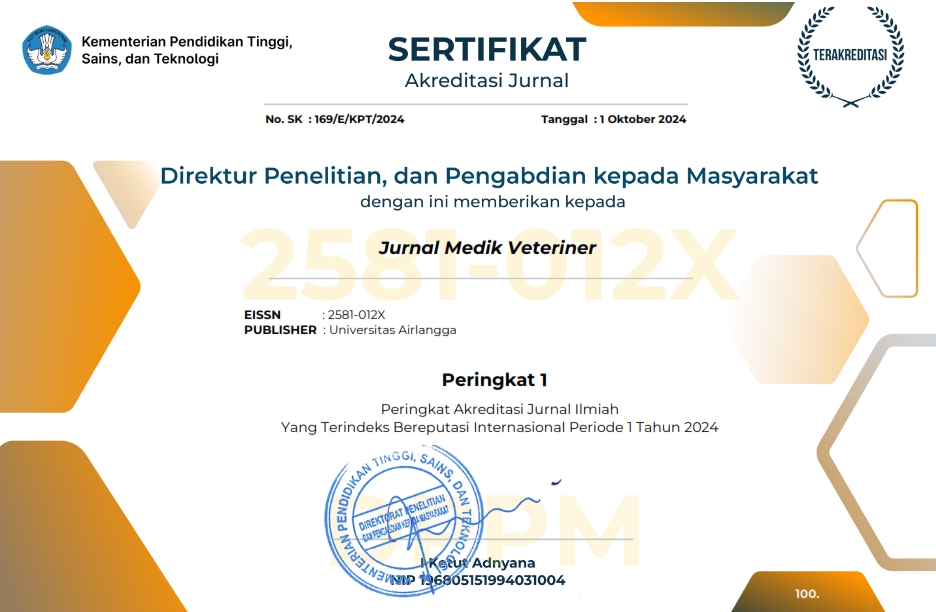Toxicity Test of Flavonoid Compounds from Ethyl Acetate Extract of Malacca Leaves with Brine Shrimp Lethality Test

Downloads
Flavonoids are a group of polyphenolic compounds produced in plants as secondary metabolites. Flavonoids have favorable biochemical effects on multiple diseases and other bioactivities. This study aimed to isolate the active compounds contained in malacca (Phyllanthus emblica) leaves and analyze toxic properties using the Brine Shrimp Lethality Test (BSLT) method in Artemia salina leach shrimp larvae. This study used malacca leaf powder with ethyl acetate solvent then macerated. Ethyl acetate extract was concentrated and fractionated, then toxicity tests were carried out. Extracts from the evaporation results were further fractionated using solvent petroleum ether, diethyl ether, and ethyl acetate. Then the ethyl acetate fraction was hydrolyzed using reflagged with 7% sulfuric acid for two hours, then the filtrate was extracted with ethanol solvent. The obtained fraction washed with aquades and dried using a vacuum desiccator. The toxicity test results showed that the flavonoid compound of malacca leaves was not toxic with a value of LC50 > 1000 ppm, an increase in the concentration of the extract was followed by an increase in the average mortality of larvae.
Alfaridz, F., & Amalia, R. (2018). Review jurnal: klasifikasi dan aktivitas farmakologi dari senyawa aktif flavonoid. Farmaka, 16(3), 1–9.
Amalia, A., Sari, I., & Nursanty, R. (2017). Aktivitas antibakteri esktrak etil asetat daun sembung (Blumea balsamifera (L.) DC.) terhadap pertumbuhan bakteri Methicilin Resistent Stapylococcus aureus (MRSA). Prosiding Seminar Nasional Biotik, 387–391.
Asmilia, N., Fahrimal, Y., Abrar, M., & Rinidar, R. (2020). Chemical compounds of Malacca leaf (Phyllanthus emblica) after triple extraction with n-hexane, ethyl acetate, and ethanol. The Scientific World Journal, 2, 1–5.
Bajuber, Q., Indiastuti, D. N., & Kusuma, E. (2020). The Analgesic Effect of Zingiber cassumunar Roxb. Ethanol Extract on Mice using Writhing Test Method. Jurnal Medik Veteriner, 3(1), 45–50.
Elangovan, N. M., Dhanarajan, M. S., & Elangovan, I. (2015). Evaluation of antibacterial and antifungal activity of Phyllanthus emblica leaf extract. International Research Journal Pharmacy Bioscience, 2(2), 59–66.
Fauzi, N. I., Ardiansyah, S. A., & Hidayat, S. (2018). Skrining mekanisme kerja daun malaka (Phyllanthus emblica L.) sebagai antibiabetes. Tropical Medicine Conference Series, 1(1), 106–110.
Kaur, J., Kaur, D., Singh, H., & Khan, M. U. (2013). Emblica offinalis: a meritocratic drug for treating various disorders. Indo American Journal of Pharmaceutical Research, 4447–4496.
Meyer, B. N., Ferrighni, N. R., Put-nam, J. E., Jacobson, L. B., Nichols, D. E., & McLaughlin, J. L. (1982). Brine shrimp: a convenient general bioassay for active plant constituent. Planta Medica, 45(5), 31–34.
Mierziak, J., Kostyn, K., & Kulma, A. (2014). Flavonoids as important molecules of plant interactions with the environment. Molecular Diversity Preservation International, 19, 16240– 16265.
Musman, M., Audina, E. Ratu, F. I. R., Erlidawati, E., & Safarida, S. (2017). Assessment of type 2 anti-diabetes on bound flavonoid of Barringtonia racemose (L.) Spreng. kernel in glucose induced diabetic rats. American Journal of Pharmacology and Toxicology, 12(3), 48–61.
Nurhayati, P. E., & Setiawan, N. C. E. (2018). Aktivitas antibakteri ekstrak etanol daun bandotan (Ageratum Conizoides L.) terhadap bakteri Staphylococcus aureus dengan metode difusi sumuran (Doctoral dissertation). Akademi Farmasi Putera Indonesia, Malang.
Puspitasari, V., Wahjuni, R. S., Saputro, A. L., Hamid, I. S., & Wibawati, P. A. (2021). Effectiveness of Clove Flower Extract (Syzygium Aromaticum L.) as Analgesic on Licking Time Reaction in Male Mice with Formalin Induction. Jurnal Medik Veteriner, 4(2), 226–230.
Qonitatillah, A., Wigati, K. W., & Irawan, R. (2020). Physical Exercise Does Not Improve Colon Inflammation in Mice Induced Lambda Carrageenan. Jurnal Medik Veteriner, 3(1), 57–64.
Saputra, M. G. A. S., Sudira, I. W., Merdana, I. M., Dharmayudha, A. A. G. O., & Sudisma, I. G. N. (2023). Evaluation of Acute Dermal Toxicity of Hibiscus Leaves as Simplicial Ointment on Albino Rats. Jurnal Medik Veterinar, 6(2), 216–229.
Singh, E., Sharma, S., Pareek, A., Dwivedi, J., Yadav, S., & Sharma, S. (2011). Phytochemistry, traditional uses and cancer chemopreventive activity of amla (Phyllanthus emblica): the sustainer. Journal of Applied Pharmaceutical Science, 2(1), 176–183.
Sundari, D., Kosasih, P., & Ruslan, K. (1996). Analisis Fitokimia Ekstrak Etanol Daging Buah Pare (Momordica charantia L.). Tesis. Jurusan Farmasi. Institut Teknologi Bandung. Bandung.
Wahyulianingsih, Handayani, S., & Malik, A. (2016). Penetapan kadar flavonoid total ekstrak daun cengkeh (Syzygium aromaticum (L.) Merr & Perry). Jurnal Fitofarmaka Indonesia, 3(2), 188–193.
Copyright (c) 2023 Muhammad Zakwan, Amalia Sutriana, Nurliana, Nuzul Asmilia, Muhammad Ammar, Arindita Niatazya Novianti

This work is licensed under a Creative Commons Attribution-NonCommercial-ShareAlike 4.0 International License.
Authors who publish in this journal agree to the following terms:
1. The journal allows the author to hold the copyright of the article without restrictions;
2. The journal allows the author(s) to retain publishing rights without restrictions;
3. The legal formal aspect of journal publication accessibility refers to Creative Commons Attribution-NonCommercial-ShareAlike 4.0 International License (CC BY-NC-SA).






11.jpg)




















